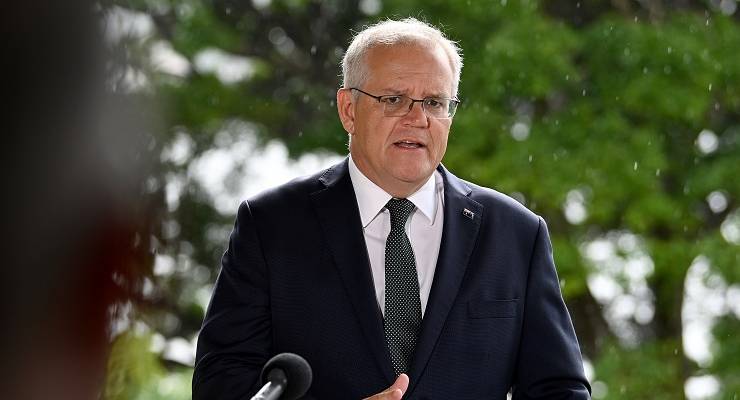
Australia’s first tranche of sanctions against Russia won’t take effect until the end of March in order to give businesses a chance to adjust, Prime Minister Scott Morrison revealed this morning.
“This is important under legislation because that gives the opportunities for businesses that have had legitimate operations and business interests in Russia and in the affected territories of Ukraine to be able to make changes to their arrangements,” the PM told reporters.
The sanctions were first announced by Morrison yesterday following a meeting with the National Security Committee of Cabinet and will become law tomorrow. They follow Moscow’s heightened aggression towards Ukraine, and will target eight individual members of Russia’s security council and a series of financial institutions — Russian State Development Bank, VEB, the military bank Promsvyazbank, Rossiya, IS Bank, the General Bank and the Black Sea Bank. The government will also extend sanctions in place for the regions of Crimea and Sevastopol to Donetsk and Luhansk, which Russian President Vladimir Putin this week recognised as independent. These will target industries like oil, gas, telecommunications and mineral reserves.
“It should send a message to any other regime out in the world that if you go down this path, if you seek to coerce and bully others then the world should stand together in targeting those who are directly at the centre of these activities,” Morrison said.
The government’s move follows similar sanctions put in place by Western governments after Putin recognised the breakaway republics of Donetsk and Luhansk, currently controlled by Russian separatists. British Prime Minister Boris Johnson also imposed restrictions on the same banks, and announced targeted sanctions on three oligarchs in Putin’s inner circle. Sanctions imposed by the United States and European Union go much further, with the Biden administration restricting Russian sovereign debt, and the EU targeting 351 members of the Duma.
This morning, Morrison conceded Australia’s actions were largely symbolic, and would likely do little to deter further aggression from Putin.
“I don’t necessarily expect it to deter an authoritarian autocratic leader which is intent on taking opportunity to pursue their own interests by violating another country’s sovereignty,” he said.
“Someone who’s clearly been preparing to do that for some time, I doubt necessarily will step back as a result of sanctions imposed. You do them because anyone who seeks to do this must face a cost. There will be a cost to Russia’s actions.”
This morning, independent Senator Rex Patrick criticised Australia’s response as not going far enough.
“We cannot be timid about this, we cannot follow the events. We need to be leading. We need to be making sure people in Moscow, Russians who have influence, are affected now,” he said.
“There’s no point having sanctions applied as the bombs are falling on Kyiv.”
Patrick called for the expulsion of the Russian ambassador and senior officials around the country.
But Morrison said Australia could escalate sanctions further if the situation worsened, and hit out at “commentary” from people outside the national security inner sanctum.
“We have plenty left in the tank when it comes to further actions we would take if and when the violence is escalated by Russia.”
Yesterday, the Russian embassy hit back at Australia’s sanctions, which it falsely described as “unilateral”, labelling the Morrison government’s actions “xenophobic”, and claiming the military build up in Donetsk and Luhansk was to protect against “ethnic cleansing”.
The statement was released after Russian ambassador Alexey Pavlovsky was called into a meeting with officials at the Department of Foreign Affairs and Trade yesterday. Morrison hit out at the embassy’s claim Russian troops were involved in peacekeeping operations.
“The suggestion that somehow Russian soldiers crossing the border and entering Ukraine is deeply offensive to anyone who has pulled on a uniform as a peacekeeper across the world which so many countries in the Pacific have as well. They’re not peacekeepers. They’re invaders,” he said.
The prime minister also confirmed visa applications from Ukrainians — around 430 of them — would be placed at “the top of the pile”. The government is still under pressure over its failure to protect Afghan nationals fleeing the Taliban, many of whom assisted Australian troops.








Morrison brings out the wet lettuce leaf again
Exactly what I thought when I was reading the article. Unfortunately we the public are going to suffer high fuel prices and lettuce shortages.
Can we place sanctions on our polies and reduce their payments to the level of their performance?
At least 430 Ukranian migrants is neither here nor there. But surely the Afghanis who actually helped Australia should be ‘top of the pile.”
“The suggestion that somehow Russian soldiers crossing the border and entering Ukraine is deeply offensive to anyone who has pulled on a uniform as a peacekeeper across the world which so many countries in the Pacific have as well. They’re not peacekeepers. They’re invaders,” he said.
Is that text a direct quote from Morrison? It’s incoherent. It’s worrying.
Incoherent and worrying? Nothing unusual from Scummo, then.
“Late March”? … In time for the election campaign proper?
You can be certain that ANY announcement from now on will have election front and centre, and timing will be carefully managed by the lNP backroomers…..
Yep, Scummo will be straining his little brain at the moment, trying to figure out how to get a khaki election out of this. Ideally, he would like to send a few Aussie troops to their deaths in Ukraine, but that’s looking a little tricky at this stage
That’s it, no Hillsong Church expansion in Russia.